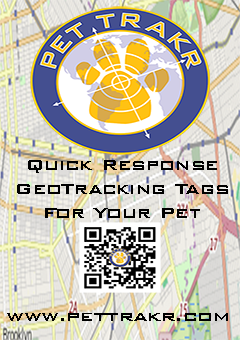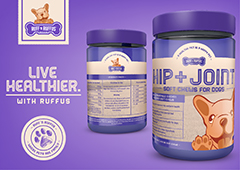New Season, New Concerns For Your Pet
Keep Your Pet Safe and Healthy This Spring and Summer
By Steve Whitney
Spring is here! Time to get outside, clean up the yard, plant your garden, organize your garage, and most of all relax and enjoy the warmer weather. Just remember that as you and your pets spend more and more time outside, be aware of the environmental hazards that come with the change of season.
CLEANING AND HOUSEHOLD DANGERS
Spring cleaning is not always easy—especially if you have pets. But did you know that some commonly used chemical cleaning agents are toxic to dogs and cats? In fact, cleansers that contain bleach, formaldehyde, isopropyl alcohol, and phenols are especially dangerous if ingested by animals. Fortunately, there are pet-safe alternatives for nearly every home cleaning use—from laundry detergents and stain removers to carpet and surface cleaners.
FLOWERS AND PLANTS
Nothing says spring like flowers, whether alive or cut these beautiful blooms can prove fatal to your furry friends. Lilies are extremely toxic to all pets and can be deadly when consumed by cats. All parts of the plant, including the pollen, flower, and leaves, are poisonous. If you must have lilies in the house, keep them well out of reach.
The foxtail plant’s barbs embed and burrow themselves into your pet’s skin, they migrate to the lungs or other internal organs. Your pet may have to endure extensive surgery to survive. Avoid foxtails by keeping out of long grass. Keep your dog on a short leash while walking or hiking. Examine your pet’s fur, ears, feet, armpits, and groin daily after they have spent time outside (this goes for cats as well) to ensure that no loose foxtails have attached themselves
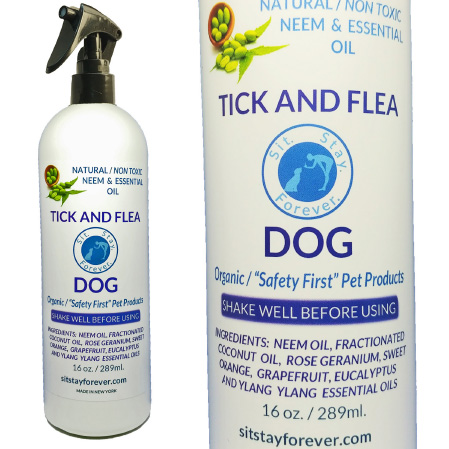
Natural flea and tick spray from Sit Stay Forever may smell pleasant to us but it’s disruptive to pests. Your pet stays bug-free without toxic flea collars or chemical tick repellant. Don’t assume ticks are just found in the country, your dog can get a tick from a city park too.

Lilies are toxic to all pets and deadly to cats. Keep your pets away from these flowers at home, in your garden or on a hike. Don’t stop to pick them in the wild and carry home a bouquet, don’t forget their looks can kill.
Foxtails are a dangeous weed, their barbs burrow into your pet’s skin and can cause severe internal damage. Avoid these weeds by staying out of tall grass. Carefully comb your dog’s fur after a hike to be sure no foxtails remain.

Bugs
Spring’s warmer weather and longer days signal the beginning of flea and tick season, time to start taking preventive measures.
Fleas: The female flea will lay 30 - 50 eggs a day. These eggs can stay dormant for up to a year, waiting for the prime time to hatch. Fleas cause skin irritation and infection. They also potentially host tapeworms.
Ticks: Host many diseases including potentially fatal Lyme disease. Look for them and remove them immediately after walks in wooded or grassy areas.
Mosquitoes: Carry heartworm disease. While it’s important to keep your pets on pet prescription heartworm medicine and holistic flea and tick meds year round, it’s essential during the warmer months.
Luckily, you can keep your pet protected year-round with external pet safe parasite prevention products like Sit Stay Forever’s which is made with a unique blend of essential oils. Their scent may smell pleasant to us but it is highly disruptive to pests’ extremely sensitive scent receptors.
Wild Animals and Rodents
As the weather warms hawks, foxes, rodents, and snakes come out of their winter hiding spots. Small cats and dogs should not be left outside alone unmonitored, even in urban areas, as you never know who’s in the sky or on the other side of the fence. Dogs carried off by hawks or coyotes is not unusual even in suburbs.
Rodents breed all year long, their busiest reproductive cycle is in the spring and fall. Rodents spread parasites, salmonella as well as hantavirus (a serious lung virus that you or your pet can catch from exposure to rodent droppings, dust, and saliva). Rodenticides can eliminate these pests however unless you are using a pet safe choice, these poisons can be lethal to your dogs and cats. There are plenty of pet safe options available today, EarthKind has Stay Away options that will not harm your dog or cat.
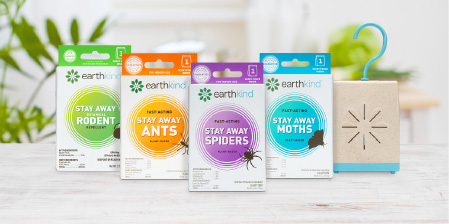
Nature has an answer for everything, and that answer isn’t bringing harmful chemicals into our homes. EarthKind’s plant-based repellents including Stay Away® Rodent are made with a mix of essential oils and other powerful botanic ingredients providing a no-kill alternative repellent solution that helps preserve the ecosystem.
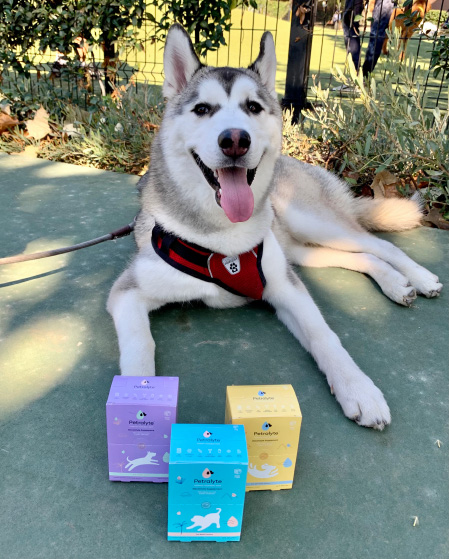
Petralyte delivers necessary nutrients and maximizes hydration for your dog. Packaged in a portable, easy-to-empty package, you’ll be able to stop and hydrate anywhere with a water bowl. Every purchase equals a serving for a pup in need.
Snakes
Snake habitat creeps further north as the earth’s climate warms. Nearly every state hosts at least one species of venomous snake which can cause pain and serious harm to our pets if not immediately treated.
Even if you don’t see the normal hiking trail as a native rattlesnake habitat, keep dogs on a short leash and by your side. Stay aware of your surroundings. Watch your step to avoid an accidental run in with a rattlesnake. They are more prevalent than you think.
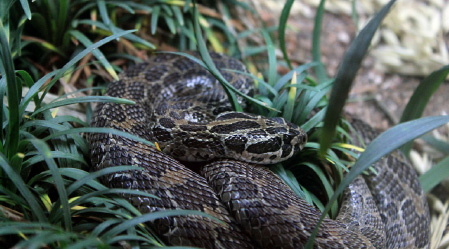
Rattlesnake bites are painful and most likely fatal to you and your pet. These snakes can blend with the landscape and seemingly appear out of nowhere. Tread carefully and keep your dog by your side when hiking.
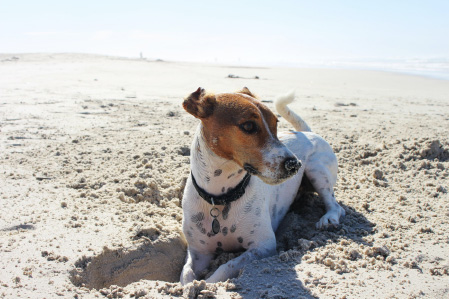
Be aware of how much time your pet is spending in the sun. Bring along sunscreen - and fresh water - for your dog. Realize prolonged sun exposure can be dangerous for Fido. If it’s hot for you, it’s even hotter for your pup.
Dehydration and UV Over Exposure
Sun, heat and exercise can bring about dehydration very quickly. Monitor your pet’s activity, always keep water and shade within close range. If your pet’s urine turns red or brown on a hot sunny day contact your vet immediately. Keep an eye out to make sure your pet has clean drinking water. Stagnant water sources like puddles, streams, and lakes may host viruses and bacteria that can lead to gastrointestinal upset or other serious health concerns.
As the days get longer and the sun’s intensity increases so does the risk of overexposure to UV rays. Animals with white coats and pale skin around their noses and eyes are traditionally more susceptible to skin cancers. Invest in your pet’s health, bring pet safe sun protection along.
Consult with your veterinarian before starting any pest control regime. Pet Poison Helpline is an animal poison control center available 24/7 to pet owners by calling (800) 213-6680
Author’s note: Steve Whitney is a degreed environmentalist, a lifelong owner and trainer of horses, dogs, and cats, and the founder/owner of Sit. Stay. Forever. Safety First Pet Products








